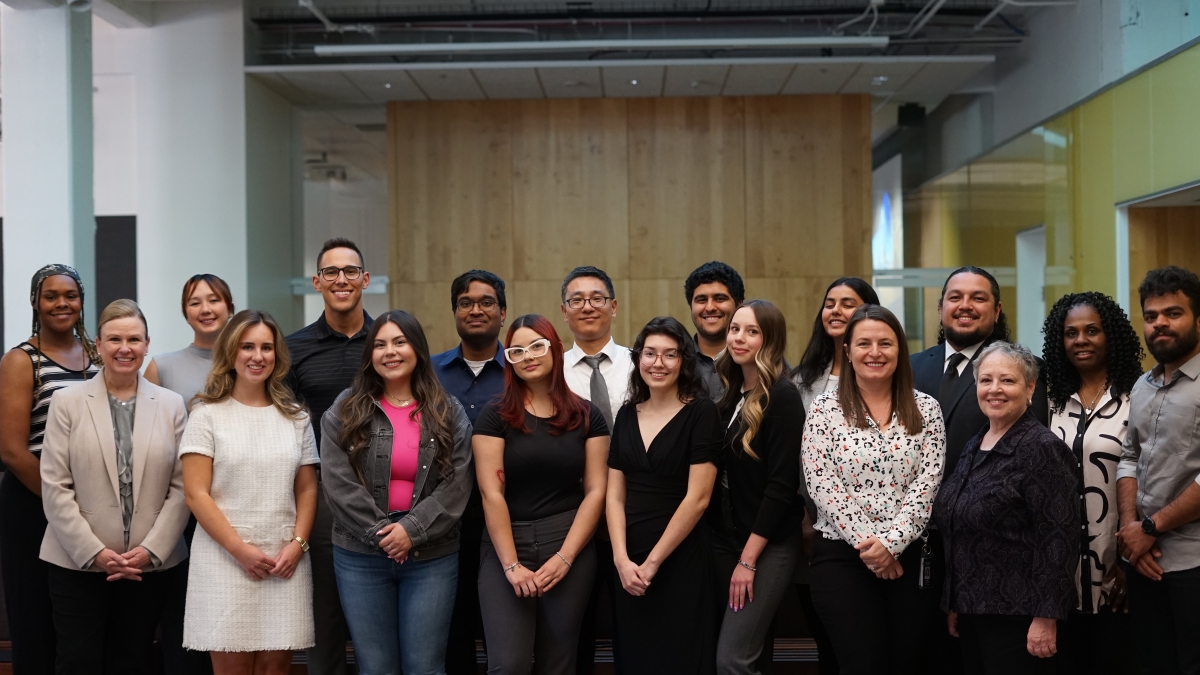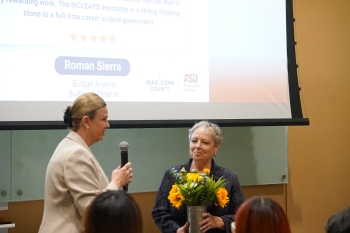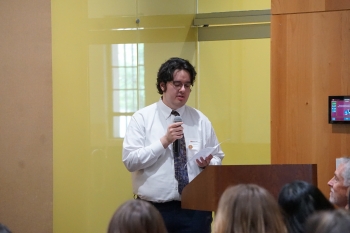County government leadership internship prepares ASU graduates for rewarding public service careers

Watts College of Public Service and Community Solutions Dean and President's Professor Cynthia Lietz (front row, far left) and Maryjo Douglas Zunk (front row, far right), coordinator of the Maricopa County Leadership and Education Advancing Public Service (MCLEAPS) program since its 2014 inception, join students and alumni at MCLEAPS' spring 2024 10th anniversary recognition ceremony. Photo by Marcus Jones/ASU
A local government leadership program at Arizona State University is celebrating a decade of helping aspiring public service professionals take the “leap” into their chosen careers.
The Maricopa County Leadership and Education Advancing Public Service (MCLEAPS) program is ASU’s partnership with the nation’s fifth most populous county, having offered more than 200 ASU students hands-on experience in county government.
Each fall and spring, students work alongside professionals to complete real projects that introduce them to the opportunities and rewards of public service careers.
The projects vary by department, complementing each participating student’s academic pursuits. But one factor has remained constant over the past 10 years: a steadfast commitment to recruiting and training the highest-performing, most dedicated young people to become the next generation of public servants.
Students build professional skills and a network of connections for career start and advancement while earning academic credit, a full waiver of ASU tuition for the semester and a paid stipend for project work they perform.
Maryjo Douglas Zunk of the School of Public Affairs has been the program’s coordinator since its inception in 2014. Since then, she said, the role of local government administrators “has broadened to include leading and managing a multigenerational workforce and constant advancements in technology, along with economic, social, political and environmental challenges and other institutional changes.”
A look back from 4 MCLEAPS alumni
• Julia Richards interned in fall 2022 with the county’s school superintendent’s office and is currently a continuous improvement analyst with the Department of Public Health.
• Roman Sierra interned in fall 2021 with the assistant county manager’s office, and in spring 2022 interned at the recorder’s office/elections department, the latter of which hired him. He is currently a budget analyst with the office of budget and finance.
• Marisa Von Holten interned in spring 2020 with the county’s Department of Emergency Management, where she highly performed during the COVID-19 pandemic. She since was promoted to her current position of emergency management coordinator.
• Brooke Hosteenez Wheeler interned in spring and fall 2015 with the county treasurer’s office, where she wrote an application for a grant for a new cost-saving records program during one semester, then implemented it the next. Wheeler is currently a policy and program analyst and lead for youth, environmental education and volunteer programs for the U.S. Bureau of Land Management in Arizona.
“MCLEAPS interns and alumni have also influenced the role of government leadership and management by bringing new perspectives, understanding and ideas to these immersive experiences, demonstrating new leadership and administration practices,” said Douglas Zunk, who in June turned over the reins of managing the program to Carlos Tavares, a senior student services program coordinator for the Watts College of Public Service and Community Solutions.
“The program will continue to serve students, the university and community partners well in its second decade,” Douglas Zunk said. “It will accomplish this through the demonstrated efficacy of the project-based work and competencies training. It also will link current and prospective employees in understanding the value of collaboration and teamwork in generating and implementing innovative solutions for local government administration.”
MCLEAPS’ future will be found in “its service as a foundation experience and launching opportunities for new and emerging public service professionals,” she said.
Alumni of the program shared stories of their experiences and how MCLEAPS helped shape their careers in government administration.
Editor's note: Answers have been edited for length and/or clarity.
Question: Tell us about your work during your MCLEAPS internship. What tasks or projects were assigned to you?
Julia Richards: I was assigned to create a survey for all registered county teachers. The survey would help the office with policy decisions on retention projects. I also communicated with all school board candidates on receiving and reviewing their personal statements and photos.
Roman Sierra: In my first internship, I learned the process of each department I worked with, particularly related to position management. By being able to see things from a top-level view, I gained a comprehensive overview of how county leadership makes decisions. At the recorder’s office, I worked on a variety of tasks including constituent correspondence, grant writing, legislative analysis and voter registration processing. The variety of tasks was a pleasant surprise and it reinforced that the county has many different roles that it performs.
Marisa Von Holten: During my first half of the MCLEAPS internship, I assisted with conducting three REPP (Risk Evaluation and Planning Program) exercises and shadowed/supported other operations and public information sections. During the second half, our department activated and established a unified command for COVID-19 response with the Maricopa County Department of Public Health. This landed me a full-time position during the internship.
Brooke Wheeler: I successfully designed and implemented the Maricopa County Treasurer's Office records management program, resulting in more efficient information retrieval and dissemination, increased office storage space, converted over 30 paper-based practices to electronic retrieval; updated 20-year-old records policies, procedures and retention schedules; and saving the department $120,000 in annual records storage and microfiche backlog processing fees. ... My work helped save the county a lot of money and improved their internal records management process. I ended up winning a national public service award for my work in 2016.
Q: Name one thing that you didn’t expect to learn during your internship but did, and what it taught you.
Von Holten: (I learned) how important the work environment, benefits and work relationships are to career viability. Coming from the military, I’ve always been used to getting the job done, regardless of the circumstances. Because of this, I aimed to find a passion job as a college student. In the MCLEAPS program and as a county employee, I realized how rare it is to find an employer who truly cares about each employee’s professional and personal success. It’s because of this culture, rather than my day-to-day job, that I could envision myself as a lifelong Maricopa County employee.
Wheeler: I learned how to navigate myself in a challenging work environment with individuals with different points of view than my own. ... While we did not (always) see eye to eye, I learned it's important to be true to yourself and your values. While speaking up for yourself might cause more stress than staying silent, I found the only way negative behaviors continue in an organization is if everyone stays silent. I also learned to speak up when someone claimed credit for my work. I still use these skills today to assert myself when this happens. It's especially important for women of color to be proud in their work and take the necessary steps to ensure their work is acknowledged.
Q: How has the MCLEAPS experience shaped your career?
Richards: MCLEAPS solidified my plan of working for Maricopa County after graduating with my master’s in public administration. I was able to see at least five departments of the county and participated in many professional development trainings. I felt that my connection between ASU and Maricopa County was great, as many of my professors at ASU had or still did work for local government. I had known I wanted to work in public health and government, but this internship solidified my decision to stay at the county.
Sierra: I have continued to work for the county after MCLEAPS, so it is still shaping my career to this day. The program showed me that a career in local government is viable and rewarding. Every day I get to do work that allows me to connect with my community and make it a better place.
Wheeler: MCLEAPS gave me the basis to understand county policy and politics. With this knowledge, I was a competitive applicant for the Arizona State Legislature Internship program for the House of Representatives minority staff. I learned the skills to navigate politics in the office and understand how county government works. I also networked with my fellow MCLEAPS cohorts, whom I am friends with today. We have leaned on each other from time to time throughout our careers.
Q: Local government is said to be the government closest to each citizen. Why is that important to a MCLEAPS intern?
Richards: It is important for an intern to understand just how impactful government actions are for each individual citizen. Though government is not glamorous, it is vital to the health and lifestyle of its people. MCLEAPS interns understand the power and responsibility their supervisors hold, and the importance of focus and dedication to their work.
Sierra: Working close with citizens in the internship setting is so important because it reminds us of who we’re working for. I did my internships while I was doing my MPA, and it was good to see high-level concepts that were taught in the classroom be implemented and impact the lives of regular people.
Von Holten: As MCLEAPS interns — and hopefully eventually as county employees — we have a unique opportunity to learn about the community we serve, as well as act as a steward for providing the best service possible. When we speak to most students, they tend to see the federal government as peak achievement. After working with us, they understand that the local level keeps them closest to their work’s hard-earned outcomes.
Q: What’s the No. 1 reason you would give a student to apply for the program?
Richards: As a grad student, there were few scholarships for tuition. The MCLEAPS program covered my tuition for the semester, and still left me with enough time to complete additional courses. It also counted for credit for school, so I felt that I was maximizing my elective credits.
Von Holten: No matter your career field or post-graduation job prospects, an internship with Maricopa County will give you professional experience that a student will be hard-pressed to find elsewhere. Our interns are not viewed simply as interns, but rather as contributing team members who get practical hands-on experience they can’t learn in a textbook.
Wheeler: (Now) that I am an internship recruiter for the federal government, I tell students about the importance of obtaining work experience through internships, because you need to have more than just coursework after you graduate to be competitive in the workforce. MCLEAPS provided me that experience and opened the doors to other internships, such as the federal internship program that transitioned me into a full-time federal government employee. I have MCLEAPS to thank for that.
More Local, national and global affairs

Higher education key to US competitiveness, security
ASU President Michael Crow’s notion of universities as public service institutions — places that serve society in practical and meaningful ways to solve pressing issues of importance to the country…

Military program leaders learn about breadth of ASU's defense-focused initiatives
Arizona State University seeks to be the U.S. military’s top partner in strategic learning and innovation. To advance this vision, the Office for Veteran and Military Academic Engagement hosted…

Expert discusses America's place in outer space with ASU students
If you asked Esther Brimmer about what security issue the United States should focus on next, she might say the moon. In fact, that’s exactly what she recently told a student at an event hosted by…



